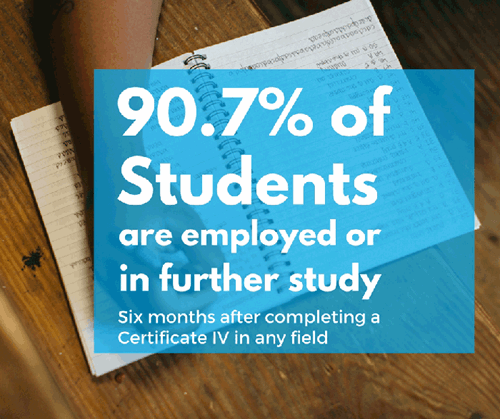What to do after finishing high school

If you’re about to finish your final year of school, the start will seem like a very long time ago now. It’s an exciting time, but everyone experiences some mixed emotions about graduation. It often means a start of a new chapter and challenge your current lifestyle. After all, for more than twelve years you have had the routine and structure of attending school, going on holidays, submitting assignments and playing weekend sport.
It’s time to consider what you’ll do after school and while this prospect is super exciting. While most students look for entry-level jobs, consider further study or think of taking a gap year, it’s understandable if you're stil unclear of the future.
For those looking to launch their career, most jobs and careers require skills and qualifications you haven’t yet acquired in school. Different trades call for different training and even in positions where you don’t necessarily need a qualification or certification of training, you'll need some sort of knowledge or experience.
At Upskilled, we are here to help you succeed. We explore the different options available to you after completing high school. Or, check out our full high school leavers guide here, now.
Gap Year
For some people, a year of unskilled work and a healthy dose of travel is a common option. Unskilled work is work that doesn’t require prior learning, or any special skills or qualifications – this means you can hand out your resume with your education and work experience on it and find a job in areas such as hospitality and retail without a university degree or vocation.
A gap year is a good way to get some perspective on what your talents, passions and values are. When you have a better idea about these aspects of yourself it’s easier to choose a learning pathway.

Enter the Workforce
As mentioned above, employment opportunities are loosely separated into different categories of work.
‘Skilled’ work refers to work that requires prior learning or skills – for example a chef in a restaurant is a skilled worker because they have undertaken education and training in food and hospitality. A waiter is an unskilled worker, not because he or she isn’t talented, but because most of the time you don’t need a qualification to be considered for the job. Because skilled workers have particular abilities and knowledge, their time is deemed more valuable than that of an unskilled worker, which means they generally earn a higher income. There’s a lot to consider when entering the workforce, but Upskilled is here to help if you’re looking for further information.

Higher Education
There are several different types of higher education. You might go to learn at a university, TAFE or a Registered Training Organisation. Each of these institutions has something different to offer you. You might have heard the words ‘vocational’ and ‘tertiary’ used to describe education.
Tertiary education happens at University, like a Bachelor of Arts for instance. It is usually theoretical knowledge across all sorts of different faculties, designed to teach you skills like reading, comprehending and communicating ideas and information.
Vocational education is centred on practical, skills-based learning – you can get vocational qualifications at TAFE or an RTO like Upskilled. The courses are usually shorter in length, cheaper, and offer industry based knowledge that is quite specific. Employers value vocational learning, and some of them even require it, for entry-level jobs in industries such as events management, hospitality, education, business, agriculture and many more.
With the job market being very competitive, it’s worth considering what you can do to invest in yourself and your career through further education.
Worried about fees? There’s a lot of financial assistance available to students in Australia, so don’t let money be a deterrent to further education.

Apprenticeships
The great thing about an apprenticeship is that you get paid to study, instead of paying to study. Australian Apprenticeships are a great opportunity to get started in building working skills and study at the same time. It’s a pathway to a nationally recognised qualification, meaning it can take you all sorts of places. There aren’t prerequisites needed to start an apprenticeship, meaning your marks at school aren’t needed to start learning a trade.

Ready to step into the working world?
Knowing what to do after high school can be an overwhelming task, especially if you are still uncertain of the direction you are headed. Here at Upskilled, we're here to help you gain clarity and provide direction where you need it most. If you're considering stepping into the working world, taking up an online short course is a great way to build your future career.
Upskilled offers training across Australia’s most in-demand industries, from rising digital skills in IT to in-demand roles in business and marketing. Best of all, each program is delivered online, helping you study according to your specific needs and schedule. Get started on your career journey and enquire with us today on a course!
Editor's note: This article was originally published in November 2016. Content has been revamped and updated for accuracy and comprehensiveness.


)
)

